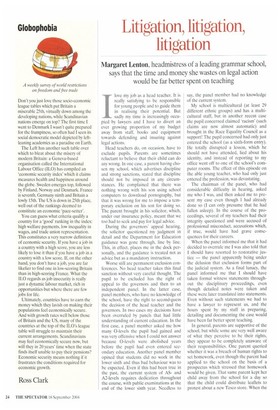Globophobia
A weekly survey of world restrictions on freedom and free trade Don't you just love those socio-economic league tables which put Britain a miserable 25th, virtually down among the developing nations, while Scandinavian nations emerge on top? The first time I went to Denmark I wasn't quite prepared for the frumpiness, so often had I seen its social democratic model depicted by leftleaning academics as a paradise on Earth.
The Left has another such table over which to bleat about the misery of modern Britain: a Geneva-based organisation called the International Labour Office (ILO) has compiled an 'economic security index' which it claims measures health and happiness around the globe. Sweden emerges top, followed by Finland, Norway and Denmark. France is seventh, Germany ninth and Britain a lowly 15th. The US is down in 25th place, well out of the rankings deemed to constitute an economic 'pace-setter'.
You can guess what criteria qualify a country for a 'good' ranking in the index: high welfare payments, low inequality in wages, and trade union representation. This constitutes a very narrow definition of economic security. If you have a job in a country with a high score, you are less likely to lose it than if you have a job in a country with a low score. If, on the other hand, you don't have a job, you are far likelier to find one in low-scoring Britain than in high-scoring France. What the ILO regards as job insecurity is really just a dynamic labour market, rich in opportunities but where there are few jobs for life.
Ultimately, countries have to earn the money which they lavish on making their populations feel economically secure. And with growth rates well below those of Britain and the US, many of the countries at the top of the ILO's league table will struggle to maintain their current arrangements. Scandinavians may feel economically secure now, but will they in 20 years' time when the state finds itself unable to pay their pensions? Economic security means nothing if it frustrates the conditions required for economic growth.
Ross Clark


















































































 Previous page
Previous page